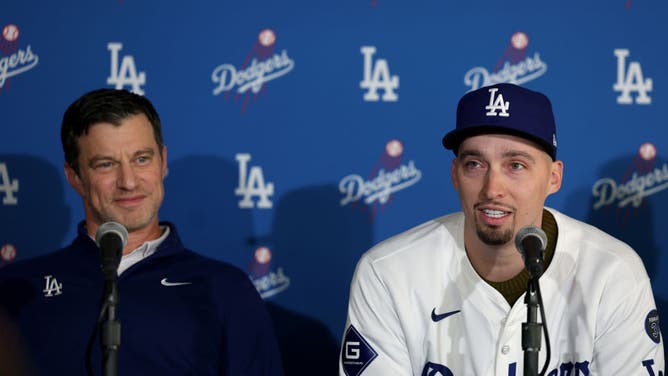Rob Manfred Doesn't Think Dodgers Are Bad For Baseball
The Los Angeles Dodgers have become the most controversial part of the Major League Baseball offseason. Mostly because opposing fans are angry that the team's front office and ownership group have decided to try and win as many games as possible, while other organizations focus on profit and cost savings.
They signed Blake Snell, Roki Sasaki, Teoscar Hernandez, Tanner Scott, Kirby Yates, Blake Treinen and Michael Conforto, adding, or re-signing, that All-Star caliber list to Shohei Ohtani, Mookie Betts and Freddie Freeman.
Because LA is operating like any organization in a competitive industry should operate, in response there's been a chorus of "bad for baseball" complaints from uninformed critics. At least MLB Commissioner Rob Manfred isn't one of them.
When asked if the Dodgers were "ruining baseball," another popular critique, Manfred strongly disagreed.
"No," Manfred said. "I don’t agree with that. The Dodgers are a really well-run, successful organization. Everything that they do and have done is consistent with our rules. They’re trying to give their fans the best possible product."
While acknowledging those obvious facts, Manfred did say that he understands why other fans are frustrated.
"I recognize, however, and my email certainly reflects it: There are fans in other markets who are concerned about their teams’ ability to compete, and we always have to be concerned when our fans are concerned about something. But pinning it on the Dodgers, not in that camp."

LOS ANGELES, CALIFORNIA - DECEMBER 03: Blake Snell and Andrew Friedman react during a press conference introducing Snell as a Los Angeles Dodger at Dodger Stadium on December 03, 2024 in Los Angeles, California. (Photo by Harry How/Getty Images)
Manfred Doesn't Blame Dodgers For Other Owners Inaction
Manfred likely didn't mean it this way, but there's no other way to interpret his comments other than as a criticism of many other MLB owners.
Yes, the Dodgers have more money to spend than say, the Miami Marlins. But the Marlins have spent zero dollars this offseason. Zero. They have more money than zero. They're just choosing not to spend it.
Manfred also said there's little they can do about where players choose to play, especially in a free market system.
"Continuity in terms of players in particular markets is an issue that’s relevant to the marketing game," he said. "Obviously, fans get attached to players, and that’s a great thing. We love that. That’s part of fandom, it’s a good part of fandom. We always try to keep the desire for player continuity in our minds when we’re talking about building a system. By the same token, I’m kind of a free market guy — players at some point in their careers, have to have a right to — I mean they have to — have a right to decide where they want to play."
This is correct, and doesn't even include situations like Juan Soto's. Soto was the Nationals top prospect, and was an immediate superstar upon his debut. He played in a massive market, Washington D.C, one of the country's biggest and richest.
Still, the Nats operated like a small market franchise, flipping Soto to the Padres with multiple years of control remaining, all because they weren't willing to sign him to a market-value contract in free agency. What's ruining baseball and continuity; the Dodgers using their resources to build the best possible team, or a team in Washington D.C. crying poor and selling off one of the best homegrown talents in decades?
Of course, the New York Mets now have almost the same payroll as the Dodgers after re-signing Pete Alonso. They've led the league in payroll season after season, with nothing to show for it. Apparently that type of unmitigated spending is fine, it's just competence fans don't like. At least Manfred isn't taking the bait.